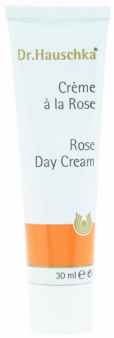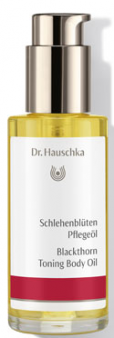Call the skincare doctor...
In 2011, my colleague Sally was suffering from facial redness and an oily T-zone with dry cheeks that felt wind-chapped, blackheads and open pores. Sally’s GP thought her problems might be rosacea and prescribed Rozex gel, an antibiotic and anti-inflammatory. After two weeks, there was no improvement and she asked me for advice.
 I suggested she consult a therapist from Dr Hauschka, the pioneering German natural skincare range first launched in 1967. To Sally’s delight, her skin calmed down and cleared up. To this day, she moisturises with Rose Day Cream, £29.50 for 30 ml, ‘because it never stings my super-sensitive skin and doesn’t clog the pores’.
I suggested she consult a therapist from Dr Hauschka, the pioneering German natural skincare range first launched in 1967. To Sally’s delight, her skin calmed down and cleared up. To this day, she moisturises with Rose Day Cream, £29.50 for 30 ml, ‘because it never stings my super-sensitive skin and doesn’t clog the pores’.  In summer, she uses Rose Day Cream Light, £29.50 for 30 ml, switching to the richer version for winter.
In summer, she uses Rose Day Cream Light, £29.50 for 30 ml, switching to the richer version for winter.
Rose Day Cream was my introduction to the brand 20 years ago when make-up artist Jenny Jordan told me she used it for model shoots to soothe overladen skin and keep make-up fresh. In 1999, Julia Roberts ‘came out’ as a Dr Hauschka devotee and a galaxy of A-listers have joined in, among them Cameron Diaz, who has been open about her ‘terrible adult acne’.
Nowadays, many of us suffer from touchy skin, prone to acne, eczema, and the sort of problems Sally experienced. Experts put this down to stressors including environmental pollutants, junk foods, work/life pressures and 24/7 living – and also skincare. ‘Products often contain too many ingredients plus synthetic chemicals that may aggravate problem skin,’ says Dr. Rabia Malik, who specialises in treating skin problems holistically.
The Dr Hauschka approach is to calm the skin, balancing moisture and sebum (oil) levels so that it functions at its best. All the ingredients are natural, some grown to biodynamic principles. ‘They are so pure you can eat them,’ promises company spokesperson Antal Adam.
The range originated from natural medicines produced biodynamically by Dr Rudolf Hauschka, a chemist who followed the Steiner philosophy that rhythms are the carrier of life and govern everything about our lives, including our skin. The key rhythms are sun and moon, light and dark (plants are harvested at specific times and there are different products for day and night), warmth and cold, movement and stillness (for instance, plant extracts are stirred and then left to rest), and lastly taking out and giving back, which, with this most ethical of businesses, applies to everything from profits to plant-growing.
 Biodynamic agriculture, developed by Dr. Rudolf Steiner in 1924, is a sustainable ‘closed’ method, where seeds, compost and fertilisers are naturally produced on the same land. One of the most fascinating concepts is that plants have their own ‘gestures’, or characteristics, that are borne out in their properties. For instance, the dark bark of the blackthorn protects the fragile buds through winter until the white blossom froths in early spring. Similarly, Blackthorn Toning Body Oil, £20.50 for 75 ml, offers warming, strengthening protection to defend skin against cold outside and drying heat inside. The best way to find products for your particular complexion is to consult a Dr Hauschka aesthetician: for local therapists, visit www.drhauschka.co.uk, which also offers a questionnaire to help you choose products. John Lewis stores in London and Edinburgh also have trained consultants.
Biodynamic agriculture, developed by Dr. Rudolf Steiner in 1924, is a sustainable ‘closed’ method, where seeds, compost and fertilisers are naturally produced on the same land. One of the most fascinating concepts is that plants have their own ‘gestures’, or characteristics, that are borne out in their properties. For instance, the dark bark of the blackthorn protects the fragile buds through winter until the white blossom froths in early spring. Similarly, Blackthorn Toning Body Oil, £20.50 for 75 ml, offers warming, strengthening protection to defend skin against cold outside and drying heat inside. The best way to find products for your particular complexion is to consult a Dr Hauschka aesthetician: for local therapists, visit www.drhauschka.co.uk, which also offers a questionnaire to help you choose products. John Lewis stores in London and Edinburgh also have trained consultants.
 BOOK OF THE WEEK; Creative, Successful, Dyslexic (Jessica Kingsley Publishers, £16.99*)
BOOK OF THE WEEK; Creative, Successful, Dyslexic (Jessica Kingsley Publishers, £16.99*)
When journalist Margaret Rooke’s 13-year-old daughter was diagnosed with dyslexia she wanted to prove that the condition need not limit her life. The result is this fascinating collection of tales from high-achievers who are also dyslexic, including Darcey Bussell (who hid in the cupboard at school to escape humiliation) and Richard Branson, as well as many who, fascinatingly, make their living through words, such as scriptwriter Lynda La Plante and comedian Eddie Izzard.
Celebrate all things organic... with the Soil Association’s Organic September. For details of events and promotions, visit www.soilassociation.org.
